Politics
/ArcaMax

Trump baffles with sudden U-turn on China buying Iranian oil
WASHINGTON — President Donald Trump on Tuesday appeared to undermine years of U.S. sanctions on Iran, giving its biggest customer China the green light to carry on buying its oil as he seeks to bolster a ceasefire with Israel.
The announcement on social media — which surprised both oil traders and officials in his own government — could ...Read more

NATO tries to use charm to keep Trump on its side
THE HAGUE, Netherlands — U.S. President Donald Trump ensured that NATO’s high-stakes summit would be a nervy affair to the end as he flew in to The Hague fueling doubts about whether the U.S. remains fully committed to defending its allies.
The U.S. president was feted as the guest of honor at a dinner hosted by King Willem-Alexander on ...Read more
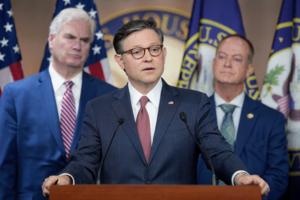
GOP weighs canceling recess to wrap up Trump's budget bill
WASHINGTON — Republican leaders are stepping on the gas to get the giant budget reconciliation package to President Donald Trump’s desk after a renewed push by the president for his Capitol Hill allies to meet his July 4 deadline.
But from tax provisions to Medicaid changes, roadblocks remain in meeting that aggressive timetable, which is ...Read more

AOC hits back at Trump calling her 'dumb': 'We eat Queens boys for breakfast'
Rep. Alexandria Ocasio-Cortez hit back at President Donald Trump Tuesday in a mushrooming social media spat after he called her dumb.
“I’m a Bronx girl,” Ocasio-Cortez tweeted. “You should know that we can eat Queens boys for breakfast. Respectfully.”
The back-and-forth started over the weekend when the progressive congresswoman ...Read more
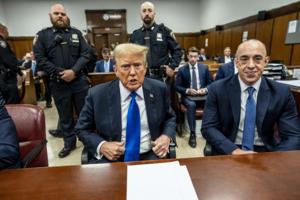
Court nominee Emil Bove faces new accusation ahead of confirmation hearing
WASHINGTON — A day ahead of a confirmation hearing for President Donald Trump’s choice of former defense attorney Emil Bove for a lifetime spot on a federal appeals court, a former Justice Department attorney said Bove had discussed plans to defy potential court orders that may frustrate the president’s deportation plans.
Bove, who was ...Read more

Trump, basking in Mideast ceasefire, displays a flare of frustration with Putin
WASHINGTON — Aboard Air Force One over the Atlantic on Tuesday, President Donald Trump turned his attention for a brief moment from the diplomatic victory he had brokered between Israel and Iran to one that has proven far more elusive.
"I'd like to see a deal with Russia," Trump told reporters before arriving in the Netherlands for a NATO ...Read more

Senate rulekeeper blocks public lands sales from Republican budget bill
A provision that would mandate the sale of federal public lands across the West — including in Colorado — cannot be included in the Republican budget bill, the U.S. Senate’s nonpartisan rulekeeper has decided.
Senate Parliamentarian Elizabeth MacDonough ruled late Monday that the sale of up to 3.3 million acres of U.S. Forest Service and ...Read more

On Dobbs anniversary, Democrats note GOP bill's abortion entanglements
WASHINGTON — Three years after the Supreme Court overturned the right to abortion in the United States, Senate Democrats are calling for the removal of further abortion restrictions in the Republican reconciliation bill.
Speaking at a news conference Tuesday, the third anniversary of the landmark decision in Dobbs v. Jackson Women’s ...Read more
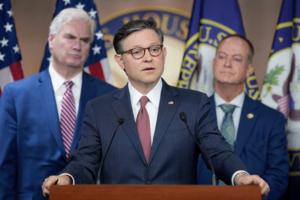
GOP weighs canceling recess to wrap up Trump's budget bill
WASHINGTON — Republican leaders are stepping on the gas to get the giant budget reconciliation package to President Donald Trump’s desk after a renewed push by the president for his Capitol Hill allies to meet his July 4 deadline.
But from tax provisions to Medicaid changes, roadblocks remain in meeting that aggressive timetable, which is ...Read more

Dropping F-bomb, Trump heads to NATO summit angry with Israel and Iran
WASHINGTON — NATO leaders kicked off a summit in the Netherlands this week without President Donald Trump, with some saying they made the journey to preserve the core values of the alliance. But a fired-up American commander in chief could put that focus to the test.
Canadian Prime Minister Mark Carney said Tuesday he was at the NATO summit ...Read more
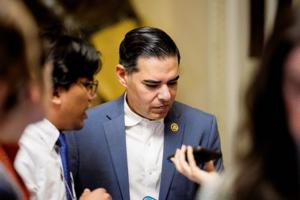
Robert Garcia wins top Democratic spot on Oversight panel
WASHINGTON — Rep. Robert Garcia of California will take over as the top Democrat on the House Oversight and Government Reform Committee, signaling a shift toward younger leadership among his party.
The ranking member position opened earlier this year when Virginia Rep. Gerald E. Connolly announced he would step down after his esophageal ...Read more
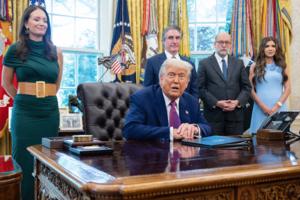
Trump orders Congress to stay in Washington to pass Big Beautiful Bill
President Donald Trump on Tuesday ordered Republican lawmakers to stay in Washington, D.C. for as long as it takes to bridge their differences and pass his sprawling budget bill.
With a self-imposed July 4 deadline looming, Trump warned the GOP-led Congress that there will be no fireworks in their home districts and holiday cookouts until they ...Read more
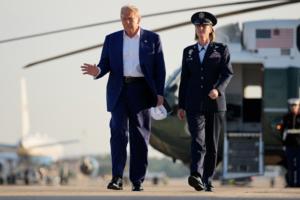
Trump's Iran strike follows pattern of presidents asserting authority
WASHINGTON — President Donald Trump’s decision to bomb Iranian nuclear facilities over the weekend falls in a decades-long tradition of military strikes of debatable legality that the other branches of government have been unwilling or unable to check, experts said.
The Constitution gives Congress the power to declare war, while a 1973 law ...Read more
Trump administration orders California to remove gender identity from sex education lessons
The Trump administration has given California 60 days to remove gender identity materials from sex education curriculum or risk losing more than $12.3 million in federal grants that helped pay for the creation and distribution of the materials.
The order is the latest clash between the administration California related to LGBTQ+ issues. These ...Read more
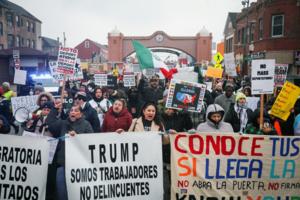
Commentary: Trump's remittance tax is a cruel double-tax on immigrant's dignity
Every week, millions of immigrants in the United States wire money across borders to their families and hometowns, not because they can afford to, but because they have to. Those funds can mean food on the table, payment of school fees or medicine for someone sick.
Now, President Donald Trump and the Republicans want to impose a burdensome tax...Read more

Harvard wins longer block on Trump's foreign student ban
A federal judge issued another court order letting Harvard University keep hosting foreign students, this one in its fight to overturn President Donald Trump’s proclamation barring their entry to the U.S.
US District Judge Allison Burroughs granted the university a preliminary injunction Monday that prevents the government from enacting a ...Read more

Supreme Court allows Trump administration to deport migrants to third countries
The Trump administration can deport migrants to third countries other than their homeland, the U.S. Supreme Court ruled on Monday, overturning a federal judge’s decision in Massachusetts that had stopped such deportations.
The high court’s ruling paves the way for the administration to transfer deported men currently held at a U.S. military...Read more

Supreme Court, ruling for Trump, says criminal migrants may be deported to South Sudan
WASHINGTON — The Supreme Court said Monday the Trump administration may deport criminal migrants to South Sudan or Libya even if those countries are deemed too dangerous for visitors.
By a 6-3 vote, the conservative majority set aside the rulings of a Boston-based judge who said the detained men deserved a "meaningful opportunity" to object ...Read more
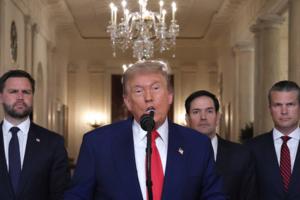
Trump's Iran strikes met with condemnation from Minnesota Democrats in Congress, praise from GOP
WASHINGTON — Minnesota’s six Democrats sharply condemned President Donald Trump’s surprise attacks on Iranian nuclear sites over the weekend, arguing that he should have received congressional authorization before they were carried out.
Meanwhile, just two of the state’s four Republicans in Congress spoke out about the attacks, both ...Read more
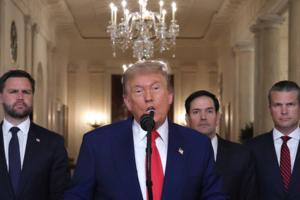
Trump's Iran strikes put potential heirs Vance and Rubio in spotlight
WASHINGTON — President Donald Trump’s decision to strike Iranian nuclear facilities put a spotlight on two former senators who could vie to succeed him as the leader of the Republican Party and his “Make America Great Again” movement: Vice President JD Vance and Secretary of State Marco Rubio.
As the commander in chief addressed the ...Read more
Popular Stories
- Commentary: Trump's remittance tax is a cruel double-tax on immigrant's dignity
- Worried about political violence, some lawmakers want to scrub home addresses
- Supreme Court, ruling for Trump, says criminal migrants may be deported to South Sudan
- Trump's Iran strikes put potential heirs Vance and Rubio in spotlight
- GOP plan to force food stamp costs on states is blocked from Senate bill























































